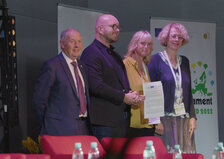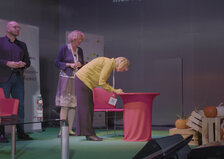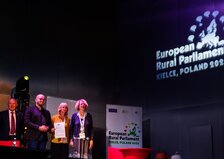Rural People’s Declaration of Kielce
15th September 2022
We, around 350 participants from 39 European countries, met during the 5th European Rural Parliament at Kielce, Poland, from 12 to 15 September 2022, gathering rural people, representatives of civil society organisations, researchers, entrepreneurs, national governments and European Union institutions.
We fully acknowledge the urgency of the current situation and the major challenges that Europe is currently facing – war, inflation, energy crises, climate and biodiversity, droughts and fires, food and security, lack of solidarity, changes created by pandemic, divided societies and other political, economic, environmental and social changes leaving impact on our communities.
Drawing on the National Rural Parliaments and other events organised by our European and national partners, the discussions in Kielce resulted in a call upon citizens and policymakers at all levels to mobilise resources and people, and ensure policies and programmes are coherent and rural-proofed. We are ready to take responsibility and call upon fellow citizens and policymakers to assist in the creation of sustainable rural communities.
Resilience to crises
1. Rural communities play a key role in our resilience to the many challenges that face us today, as was shown during the pandemic. Rural diversity, resources and resilience are of critical value to society. The local actors are responsible for the quality of the engagement in their communities. Many rural areas embody unique local solutions within civil society, local action groups, village councils, smart village strategies and other. Activities promoting social wellbeing, enabling cooperation, education, support to community leaders and building trust are key aspects, in addition to economic support, to decrease social tensions between different groups and opinions. Rural sustainability also depends on support for critical local services, infrastructure and economic development, and for young people, minorities and migrants.
2. In recognition of this critical role, support for rural communities requires greater emphasis, integration and consolidation. Vision objectives and good will should be reflected genuine rural agenda at European and national levels, devoting appropriate funding for it and including rural development within the broader political framework. Restructuring of public sector linkages will be critical to a more integrated, strategic approach. Cooperation between all who are responsible for rural areas in European, national and regional level is vital. A holistic and integrated approach needs to involve all policy areas and levels to reflect rural reality.
Security and solidarity
3. Equality, human rights and solidarity are fundamental values in ensuring our future security in the face of global challenges. These must be key foundations for policy and action as we go forward, with major implications as to how we organise our societies and democracies.
4. Existing practices of democracy are experiencing challenges and will require scrutiny and strengthening at all levels, to ensure inclusiveness, representativeness and robustness. Participatory democracy and capacity building of civic competences needs to be expanded to include individual representation and new forms of digitalisation. Support available to communities within different programs must not be diminished by bureaucracy, narrow frameworks or distrust, at national or European level. Result based, simplified and understandable procedures should be in place, validating knowledge, existing practices and the voluntary work of people.
5. Financing of rural development and rural communities should represent rural reality therefore it requires to be strengthened and broadened to increase local access to and control over funds. This is the case within EU Programmes, and at national level. The EU-framework for the 2028-2034 period should include a truly holistic approach and direct programs for rural development also as part of Cohesion Policy. Programmes should be deployed on a decentralised basis, through local partnerships, so that financial support can best respond to the needs and challenges. Community Led Local development (CLLD) should be mandatory in all member states, including all European Structural and Investment funds (ESI).
6. We support peaceful conflict resolution. However, all levels of governments, communities and individuals should be aware of the importance of preparedness and actively build resilience, e.g. in the form of knowledge, readiness for food security, energy and fuel reserves as well as securing access to trustworthy information.
7. The most significant, long-term and overarching challenges we now face stem from the natural environment in which we must all live and over which we are having significant impact. This is manifested in climate change and biodiversity loss. We cannot wait any longer to tackle these challenges. We urge all levels, individuals, organisations and governments to take rapid and significant action.
8. Energy is fundamental to modern society, and the move to zero carbon must be speeded up. Rural areas provide the location and sources of many kinds of renewable energy systems, from which we can benefit, and local people should have control over and be able to benefit from it.
9. Finally, we cannot continue the economic paradigm of unlimited growth, which brought us to the fragile situation we are in today. We all need to accelerate the process to reach an economic system that lies beyond growth towards a sustainable development model.
Signed by co-initiators and host of the 5th Gathering of the European Rural Parliament:
Āris Ādlers
president of PREPARE Network
Urszula Budzich-Tabor
member of the board of Polish Rural Forum
Marion Eckardt
president of European LEADER Association Rural Development (ELARD)
Tom Jones
president of European Rural Community for Alliance (ERCA)



